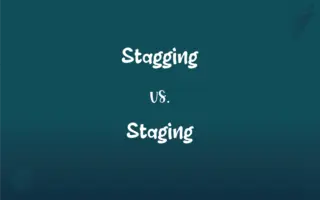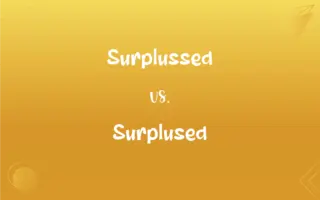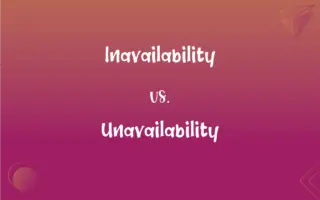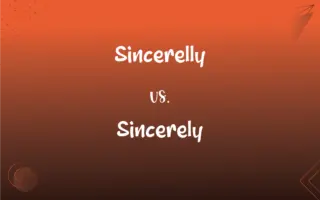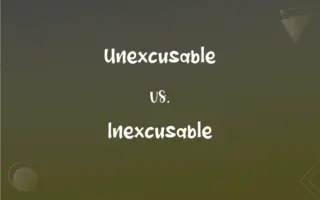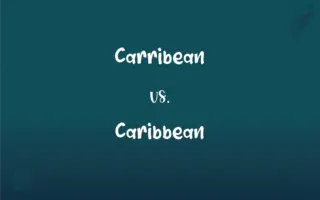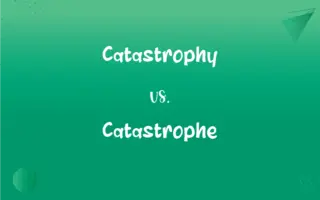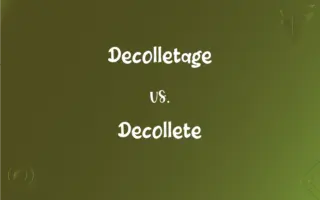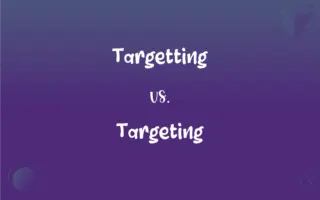Deside vs. Decide: Mastering the Correct Spelling
Edited by Aimie Carlson || By Janet White || Published on March 9, 2024
"Deside" is incorrect; the correct spelling is "decide," which means to make a choice or resolve.

Which is correct: Deside or Decide
How to spell Decide?

Deside is Incorrect

Decide is Correct
ADVERTISEMENT
Key Differences
"Decide" contains "cide" like in "precise," indicating clarity in choice.
Recall "decide" shares "c" with "decisive," both about firm decisions.
"Decide" has a "c," while "desire" has an "s"; "decide" involves choice, not just want.
Link "c" in "decide" to "choose" and "conclude," both decision-related.
Use "i" in "decide" to symbolize the individual making a decision.
ADVERTISEMENT
Correct usage of Decide
I can't deside what to wear today.
I can't decide what to wear today.
They couldn't deside on a name for their new puppy.
They couldn't decide on a name for their new puppy.
Can you deside which movie you want to watch?
Can you decide which movie you want to watch?
She needs to deside if she's going to the party or not.
She needs to decide if she's going to the party or not.
We have to deside on a location for our next meeting.
We have to decide on a location for our next meeting.
Decide Definitions
To make up one's mind about something, indicating a final choice.
He finally decided on the blue shirt for the interview.
To decide is to settle a question or dispute through authority or reasoning.
The jury decided in favor of the defendant.
To decide also means to influence the outcome or determine the result.
Her last-minute goal decided the match.
Decide implies ending uncertainty or indecision by making a clear choice.
After much thought, they decided to buy the house.
To decide means to resolve or conclude after consideration; making a definitive choice.
She decided to travel to Paris for her vacation.
To reach a conclusion or form a judgment or opinion about (something) by reasoning or consideration
Decide what to do.
To cause to make or reach a decision
"The presence of so many witnesses decided him at once to flee" (Robert Louis Stevenson).
Decide Sentences
It took me a long time to decide on my major in college.
Let's decide where to go on vacation by the end of the day.
You need to decide whether you're attending college or going straight into work.
It's hard to decide when faced with so many good options.
Can we decide on a theme for the party tonight?
The jury has to decide on the verdict after the trial concludes.
The committee will decide the winner of the scholarship by next week.
Before you decide, make sure you have all the necessary information.
The team needs to decide quickly how to address the unexpected challenge.
You have to decide for yourself what's right and wrong in this situation.
Parents often have to decide what's best for their children, even if it's tough.
We should decide how much to budget for our project.
Decide Idioms & Phrases
A tough decision to decide
A difficult choice that requires careful thought.
Choosing between the two job offers was a tough decision to decide.
Decide against
To conclude not to proceed with something after considering it.
She decided against going to law school and pursued a career in the arts instead.
Make a decision and decide
To come to a conclusion and act upon it.
After weeks of research, he made a decision and decided to invest in the new company.
Decide once and for all
To make a final decision, resolving the issue completely.
We need to decide once and for all where to spend our family vacation.
Decide between
To choose one of two or more options.
It was difficult to decide between the two universities, as both offered excellent programs.
Decide in haste
To make a decision quickly, possibly too quickly.
Deciding in haste, she later regretted her choice.
Let the heart decide
To follow one's emotions or feelings in making a decision.
When it came to choosing a career path, he let his heart decide.
Decide for the greater good
To make a decision that is best for the most people, even if it's not beneficial for oneself.
The leader decided for the greater good, putting the needs of the many above his own.
Decide on the spot
To make a quick decision without much deliberation.
Faced with the offer, he had to decide on the spot.
Decide in favor of
To choose one option over others after consideration.
After reviewing the proposals, they decided in favor of the more sustainable project.
Leave it to decide
To allow time or another person to make a decision.
They left it to decide which course of action would be best.
To decide under pressure
Making a decision while facing stress or urgency.
She had to decide under pressure which offer to accept.
Decide beyond a shadow of a doubt
To make a decision with complete certainty.
The evidence allowed the jury to decide beyond a shadow of a doubt.
To decide out of necessity
Making a decision because circumstances require it, not necessarily because one wants to.
They decided out of necessity to downsize their home.
To decide without reservation
To make a decision with confidence, without hesitation.
She decided without reservation to move abroad for her studies.
Decide by a thin margin
To make a decision where the preference or difference is very slight.
The election was decided by a thin margin.
Have a decision to decide
To be faced with a choice that one must make.
With both colleges accepting him, he had a decision to decide.
Decide on principle
To make a decision based on one's fundamental beliefs or values.
He decided on principle not to invest in companies that harm the environment.
FAQs
What is the pronunciation of decide?
Decide is pronounced as /dɪˈsaɪd/.
Which vowel is used before decide?
The vowel "i" is used before the "d" in "decide."
What is the root word of decide?
The root word is Latin "decidere."
What is the verb form of decide?
The verb form is "decide."
Which conjunction is used with decide?
Conjunctions like "whether" or "if" are often used with "decide."
Why is it called decide?
It's called "decide" from Latin "decidere," meaning "to cut off," indicating a resolution or conclusion by "cutting off" other options.
What is the singular form of decide?
The singular form is "decide."
What is the plural form of decide?
"Decide" doesn't have a plural form; it's a verb. Verbs change form based on tense, not number.
Which article is used with decide?
The indefinite article "to" is often used, as in "to decide."
Is decide an abstract noun?
No, "decide" is a verb, not a noun.
Is decide a negative or positive word?
"Decide" is neutral; context determines its positive or negative connotation.
Is decide a countable noun?
No, "decide" is a verb, not a noun.
Is decide a noun or adjective?
"Decide" is a verb.
How many syllables are in decide?
"Decide" has two syllables.
Which determiner is used with decide?
Determiners are not typically used with the verb "decide."
Which preposition is used with decide?
"On" or "about" can be used with "decide," e.g., "decide on a plan."
Is decide a collective noun?
No, "decide" is a verb, not a noun.
Is the word decide imperative?
"Decide" can be used in the imperative mood, as in commands or requests.
What is another term for decide?
Another term for "decide" is "determine."
What is the opposite of decide?
The opposite of "decide" could be "hesitate" or "waver."
What is the second form of decide?
The second form is "decided."
What is the third form of decide?
The third form is "decided."
Is decide an adverb?
No, "decide" is not an adverb.
Is the decide term a metaphor?
No, "decide" is used literally, not as a metaphor.
How do we divide decide into syllables?
"Decide" is divided into syllables as de-cide.
What part of speech is decide?
"Decide" is a verb.
How is decide used in a sentence?
"They need to decide where to go for dinner."
What is a stressed syllable in decide?
The second syllable, "-cide," is stressed in "decide."
What is the first form of decide?
The first form is "decide."
Is decide a vowel or consonant?
"Decide" is a word, not a vowel or consonant.
About Author
Written by
Janet WhiteJanet White has been an esteemed writer and blogger for Difference Wiki. Holding a Master's degree in Science and Medical Journalism from the prestigious Boston University, she has consistently demonstrated her expertise and passion for her field. When she's not immersed in her work, Janet relishes her time exercising, delving into a good book, and cherishing moments with friends and family.
Edited by
Aimie CarlsonAimie Carlson, holding a master's degree in English literature, is a fervent English language enthusiast. She lends her writing talents to Difference Wiki, a prominent website that specializes in comparisons, offering readers insightful analyses that both captivate and inform.


